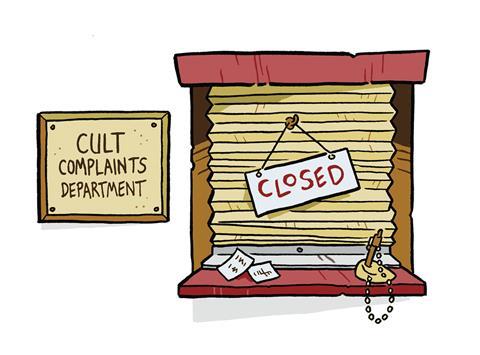Questions are healthy. If you’re in an environment where voicing doubts is forbidden, then watch out, says Rend Collective’s Chris Llewellyn. You could be in a cult

The Rolling Stones used to get off stage and snort cocaine. Our band get into our PJs, pour a bowl of cereal and watch Netflix documentaries.
In the boring-yet-appropriate absence of our own scandals, it seems we’re irresistibly drawn to those of others. The theme of our post-show tour bus viewing over the last year has often been exposés of various cults. We have a macabre fascination with the gory details of these high-control religious groups.
A recurring plot line seems to emerge: there is a charismatic leader, always dangerously out of reach of accountability. The culture always rewards blind faith in the leadership. Those who question authority are met with aggression and gaslighting, meaning their own character is called into question, rather than the leader’s. Ultimately, if they keep asking questions, they will be shunned. The faithful will become victims of psychological abuse (at a minimum), physical or sexual harm, or financial ruin.
It’s a sad, predictable story. If I’m honest, I often find myself wondering how the victims get sucked in – a reaction I’m ashamed of. But with a little more reflection, a haunting question hits me: How different are these cults from what I’ve experienced in the evangelical movement? Have I been sucked in too?
Let’s get one thing straight: Christianity itself is not a cult. Rightly understood, it is the opposite: a lifegiving source of freedom. I’m not even saying that evangelicalism is a cult…but pockets of it have employed cult-like practices. We’ve all heard the scandals, just look at the news, or download Premier Christianity’s podcast series ‘Soul Survivors’.

I think I have a solution. It’s a scary word in evangelical circles: deconstruction. The people who have labelled their faith journey as such are often subject to mockery or contempt – but isn’t that what cults do to those who ask questions of the established order?
I’m not saying that every version of deconstruction (or every person who is deconstructing) is right, or that every negative reaction to deconstruction is unwarranted, but I do believe we need to welcome genuine critique and questions. The difference between a healthy institution and a cult is that the complaints department ought to be open at all times. The bravery to challenge the status quo is actually a Christ-like quality, but we rarely encourage it as such.
There is a difference between examining the building blocks of our faith with a view to “[rebuilding] the ancient ruins” (Isaiah 61:4) and taking a wrecking ball to the whole thing. But fearlessly turning over every stone of our faith (and our religious institutions) can be a holy and healing practice.
Sometimes the best way to be loyal to the Church – and to Jesus – is to risk appearing disloyal by pointing out its failings. Jesus said: “Be wise as serpents and innocent as doves” (Matthew 10:16, ESV). Maybe it’s all these cult documentaries, but I’m starting to think a good paraphrase of that verse might be: “Don’t drink the Kool-Aid.”






































No comments yet